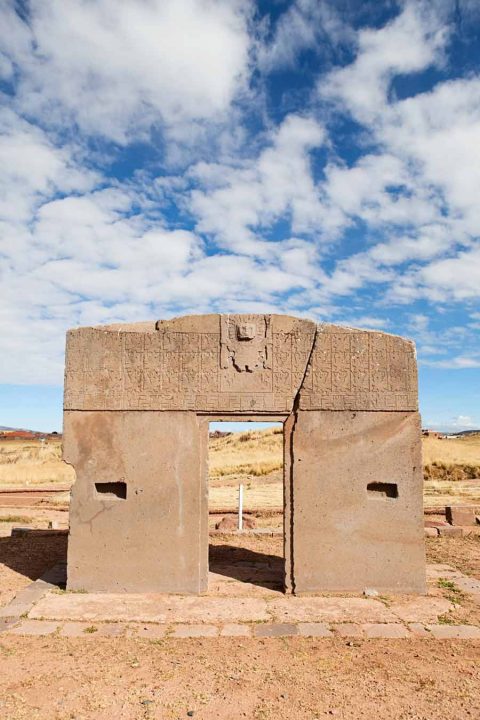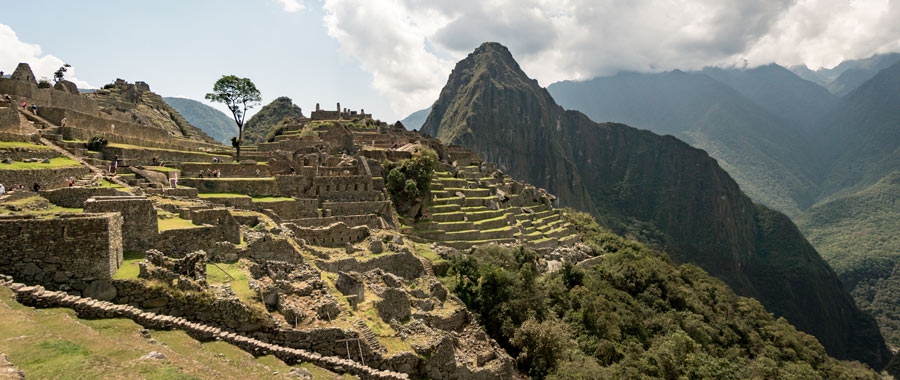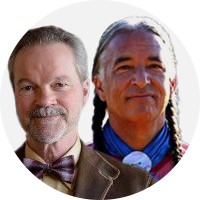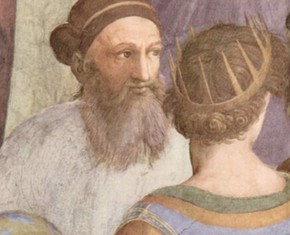The views expressed in our content reflect individual perspectives and do not represent the authoritative views of the Baha'i Faith.
In this continuing conversation about Indigenous beliefs and their relationship to the Baha’i teachings, Chris Buck and Kevin Locke discuss seeing the profound spiritual truths in both.
Q: Kevin, could you please comment on this Baha’i policy from the Universal House of Justice, the governing body of the world’s Baha’is?:
The Baha’i attitude to earlier religions, therefore, is not that they are false or “heathen”, but that, at root, they are all true and that these fundamental truths still persist within them. Baha’is encourage Indians in South America, for example, to see and reverence the profound spiritual truths which are to be found in both their pre-Christian religions and in the Catholicism which, in later centuries, has to varying degrees supplanted or overlaid their archaic faiths. – The Universal House of Justice, Letter to a National Spiritual Assembly.
A: Thanks, Chris, I’d love to discuss this powerful concept. When one goes beyond the Disney World-esque bubble ride, pre-packaged for tourists experience in the Andes, one finds a universe peopled by very non-European ancestry. The colonizers were not successful in eradicating the core Indigenous identity and language from most of the Andean region. In large part, because of their core spiritual identity, the Indigenous Andean region was the first place where large numbers of Indigenous people became Baha’is in the western hemisphere. I will never forget visiting Machu Picchu with Baha’i Quechua and Aymara elders, who shared the true history and significance of this sacred spot and were able to perform the proper protocols of reverence for Inti Punku (“Gate of the Sun”) and other sacred sites there.

Q: Located near Cuzco (also called the “City of Stone,” as is Machu Picchu as well) in Peru, Inti Punku is along the “Path of Viracocha,” from Tiahuanaco, to Cuzco, onward to Ollantaytambo and finally to Machu Picchu. About Viracocha (see “The Return of Viracocha, the Prophet of the Incas,” Part 4 in this “Indigenous Messengers of God” series), Hooper Dunbar, retired Universal House of Justice member, said:
“… from a Baha’i point of view, all the teachers have been at the same college. That is, they’re inspired with the same universal knowledge. But they’re not able to deliver a message which is not relative to the time that they appear in. Christ is going to call us to a united mankind? Let the globe be one? Let the earth be one? The earth was flat when he spoke. It was still flat. Nobody knew about America except the Americans, the early Americans. They had their own messengers. But you go amongst the tribes in South America, and so on. They’ve had lesser guides and they have had greater guides. Viracocha was the great Incan prophet …. And he taught the basic virtues is what he taught. And when the Christian missionaries go and speak to them and tell them that Christ walked on the water in the Sea of Galilee, they said, ’Oh, he may be then. He may be right, because our Viracocha walked on the Lake Titicaca. We have traditions about that!’” — Hooper Dunbar, “Introduction to the Baha’i Faith” (January 2019, Pasadena, CA).
So when we read that “Baha’is encourage Indians in South America, for example, to see and reverence the profound spiritual truths which are to be found in … their pre-Christian religions,” do you see that policy as quite remarkable and extraordinary, in and of itself?
A: Yes, Chris, is it correct to say that, although individuals from other faith traditions may acknowledge aspects of the spiritual heritage of the Indigenous peoples of the Western Hemisphere, the Baha’i Faith is the only world religion that has taken an official affirmative stance in this regard.
I also find it very noteworthy that Ruhiyyih Khanum, the last survivor of the Baha’i holy family, made a particular point to visit Indigenous communities no matter how remote they might be. Personally, I well recall visiting Indigenous villages that required arduous journeys via all-terrain vehicles and then, having reached the limit of motorized travel, walking treacherous mountain pathways to a village that Ruhiyyih Khanum had traveled to decades before. As the most prominent member of the Baha’i Faith during her lifetime – after her husband, Shoghi Effendi, the Guardian of the Baha’i Faith, passed away in 1957 — her actions speak volumes.
Q: In that same vein, let’s take a close look at a similar statement by the Baha’i International Community, an agency of the Universal House of Justice and which serves as a nongovernmental organization (NGO) with consultative status at the United Nations:
“Baha’is, believing in all revealed religious truth of past ages as an unfoldment of one divine plan, have respect for the customs and traditions relating to these religions and cultures. They desire to preserve the cultural elements that contribute to the well-being of man. An effort is made to acquaint people with their own history on earth. … Because of the Baha’i belief in the unity of mankind, all people are recognized as valued members of society and play an equally important part in building world order.” – From information submitted by the Baha’i International Community for a “Study of the Problem of Discrimination against Indigenous Populations,” undertaken by the United Nations Sub-commission on Prevention of Discrimination And Protection of Minorities,” [U.S.] Baha’i News (February, 1975), p. 19.
So one key way that the Baha’i Faith seeks to promote unity within and among Indigenous peoples – and with the world at large – is to honor, respect, preserve and discover more about Indigenous spiritual heritages, by accentuating their spiritual harmonics with the best that other religions around the world have offered in their own sacred teachings – all of which the Baha’i Faith recognizes, respects, reinvigorates and revoices in global octaves, in what could be called the spiritual “music of the spheres.” Wouldn’t you agree?
A: Yes, of course. That’s a good way of putting it. These official Baha’i statements – which you have quoted and asked me about – validate and confirm everything we have been talking about throughout this “Indigenous Messengers of God” series. To show respect to people of all cultures is a Baha’i virtue, encouraged throughout the Baha’i writings. Beyond showing respect to the people themselves is respecting their cultures. Deeper than that is respecting their religions. Speaking of the spiritual “music of the spheres,” Indigenous peoples in the Western Hemisphere have their own spiritual “music” – their sacred traditions. Encouraging study of Indigenous sacred traditions is like “music appreciation.” All of the Baha’i teachings about “Progressive Revelation” can – and should – apply to Indigenous sacred traditions. One has to be open-minded to learn about, understand, and respect the spiritual melodies and music of Indigenous traditions that are outside of our dominant culture.
As I’ve said before, the Western Hemisphere is the “other half” of the world. Religions are not only part of the so-called “Old World.” They are part of the “New World” as well! If we do not respect and appreciate Indigenous sacred traditions, then we cannot fully embrace the Baha’i principle of the oneness of religion. As Baha’is, not only should we each “Consort with all religions with amity and concord, that they may inhale from you the sweet fragrance of God,” as Baha’u’llah advised us to do in his Most Holy Book, but Baha’is should also promote “harmony and peace among religions.” What better way to do this, with respect to Indigenous peoples across the Americas, than to respect their sacred traditions? From a Baha’i point of view, the greatest respect that we can show to Indigenous peoples’ sacred traditions is to recognize and respect their respective Indigenous messengers of God, who originally brought those sacred teachings in the first place!
Q: Thanks, Kevin. Well put! That said, this is a perfect segue into our next article, where we’ll discuss the most frequent criticism that I’ve encountered, over the past quarter-century, in promoting this Baha’i-inspired respect for Indigenous messengers of God – those “Wise Ones” spoken of by Universal House of Justice.
















Comments
Sign in or create an account
Continue with Googleor